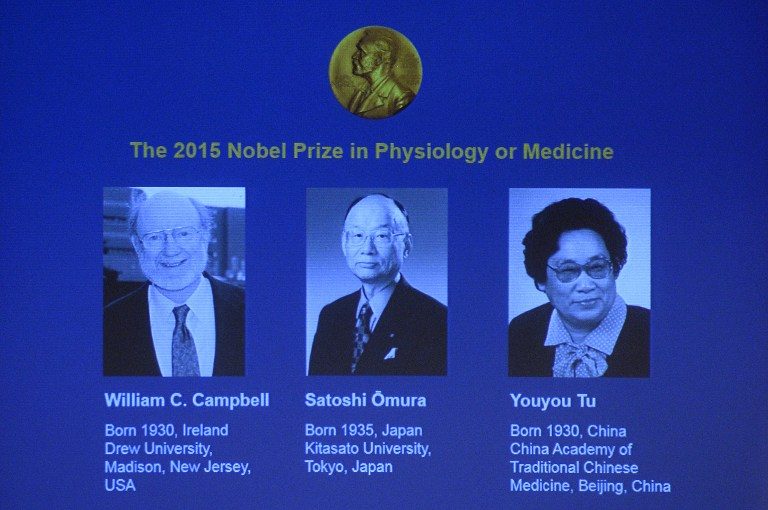SUMMARY
This is AI generated summarization, which may have errors. For context, always refer to the full article.

STOCKHOLM, Sweden – A trio of scientists earned the 2015 Nobel Prize for Medicine on Monday, October 5, for unlocking revolutionary treatments for malaria and roundworm, helping to roll back two parasitic diseases that blight millions of lives.
Tu Youyou of China won half of the award for her work in artemisinin, a drug based on ancient Chinese herbal medicine, the Nobel jury announced.
She is the first Chinese woman national to win a Nobel prize in science, and only the 12th woman to win the medicine prize among the 210 laureates honored since 1901.
Irish-born William Campbell and Satoshi Omura of Japan shared the other half for an anti-roundworm treatment dubbed avermectin, derived from soil-dwelling bacteria.
“These two discoveries have provided humankind with powerful new means to combat these debilitating diseases that affect hundreds of millions of people annually,” the Nobel committee said.
“The consequences in terms of improved human health and reduced suffering are immeasurable.”
Tu, 84, has been chief professor at the China Academy of Traditional Chinese Medicine since 2000.
She conducted research in the 1970s, at the height of China’s Cultural Revolution, that led to the discovery of artemisinin, a drug that has slashed the number of malaria deaths.
Traditional medicine
The treatment is based on traditional medicine – a herb called sweet wormwood or Artemisia annua.
Artemisinin-based drugs are now the standard combination for treating malaria since the mosquito-transferred Plasmodium parasite developed resistance to other drug types like chloroquine.
According to the World Health Organization (WHO), there were about 198 million malaria infections in 2013 and 584,000 deaths – most of them African children.
Social media users in China saw the award as a source of national pride for the country.
“So proud, so proud, Chinese people are awesome,” read a post on Sina Weibo, a Chinese version of Twitter.
“Nobel Prize, good. More international achievements recognised globally represent China’s rise,” said another.
The other half of the prize honoured Omura and Campbell for “a new class of drugs with extraordinary efficacy against parasitic diseases,” the Nobel statement said.
Registered drugs derived from avermectin “have radically lowered” the incidence of river blindness and elephantiasis, both caused by parasitic worms, it added.
River blindness
River blindness, also known as onchocerciasis, is caused by a worm transmitted to humans through the bites of infected blackflies. Its symptoms include disfiguring skin conditions and visual impairment, including permanent blindness.
More than 99 percent of those affected by it live in Africa.
Elephantiasis or lymphatic filariasis, is a mosquito-borne infection which causes grotesque and disfiguring swelling of the limbs.
Omura, a microbiologist, isolated new strains of a group of bacteria called Streptomyces, and successfully cultured them in the lab.
Campbell, a research fellow emeritus at Drew University in New Jersey in the United States, was born in 1930 in Ramelton in County Donegal in northwest Ireland.
His role was to show that a component from one of Omura’s cultures was active against parasites – this became avermectin.
“I humbly accept the prize,” 80-year-old Omura, a professor emeritus at Kitasato University, said in a interview with the Nobel Foundation.
He thanked the “many, many researchers” who had contributed to his findings, saying he was “very, very lucky.”
Juleen Zierath, the head of the Nobel committee, said she believed Swedish scientist and philanthropist Alfred Nobel – who created the awards in his 1895 will, to be given to those who “have conferred the greatest benefit on mankind” – would have been happy with this year’s choice of laureates.
‘Saving lives’
“I think we have examples here that have conferred the greatest benefit on mankind. These therapies, they save lives, they prevent disability, and they prevent the spread of infection. And they also improve the life, the well-being of individuals and economic growth. So I think this is a great example. Nobel would have been happy,” she told the Nobel Foundation.
The Swedish news agency TT said the Nobel Foundation had not yet been able to reach Tu and Campbell to inform them of their prizes.
This year’s Nobel laureates will share the prize of eight million Swedish kronor (about $950,000 or 855,000 euros).
The Nobel awards week continues with the announcement of the prize for physics on Tuesday, chemistry on Wednesday and literature on Thursday.
The peace prize will be awarded in Oslo on Friday, with the economics prize wrapping up the Nobel season next Monday.
The laureates will receive their prizes at formal ceremonies in Stockholm and Oslo on December 10, the anniversary of the 1896 death of Alfred Nobel. – Rappler.com
Add a comment
How does this make you feel?
There are no comments yet. Add your comment to start the conversation.